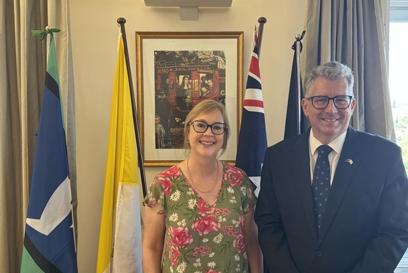Caritas Australia in Timor-Leste has hosted a visit by CatholicCare NT, also attended by four women’s shelters that are partners of the Caritas Australia Protection Program in Timor-Leste. This meeting was an opportunity for the organisations to share knowledge and expertise around running effective safe houses for those escaping gender-based violence.
In Timor-Leste 59 percent of girls and women between the ages of 15 to 49 have experienced gender-based violence. In the Northern Territory rates of domestic violence are the highest in Australia, with 61 domestic and family violence incidents per day, and Aboriginal women making up 89 percent of the victims.
CatholicCare NT has been operating in the Northern Territory for 30 years, delivering a broad range of clinical, case management and community development programs. Services focused on gender-based violence include a crime victims counselling service, a men’s behaviour change program, primary prevention program NO MORE, and safe houses.
Caritas Australia’s Protection Program in Timor-Leste includes shelters for women fleeing violence, practical support for survivors such as savings and loans and small businesses training, and training in gender-based violence prevention. This program is supported by Caritas Australia’s generous donors, as well as the Australian Government through the Australian NGO Cooperation Program (ANCP).
Fernando Pires, Timor Leste's country representative at Caritas Australia, said, “Gender-based violence is pervasive and while cultural differences might alter program delivery in each community, there is a level of universality to the experience of many women and girls that we can learn from.”
“Meeting with like-minded organisations, such as CatholicCare NT, enables us to combine the tireless work being done by dedicated people in this field. Doing so allows us to better understand how we can better support communities, while leaving us inspired as we continue striving for change amid challenging circumstances.”
Caritas Australia supports women in marginalised communities across the world facing many challenges including lack of education and training, food insecurity, inadequate access to health care, gender-based violence and discrimination.

















